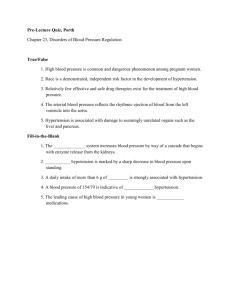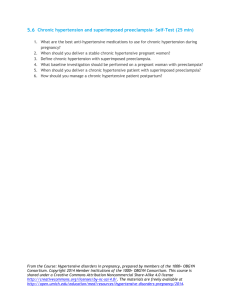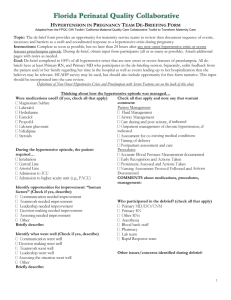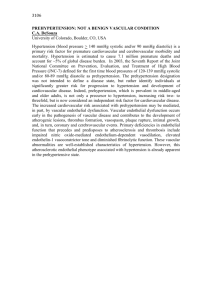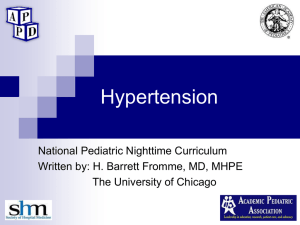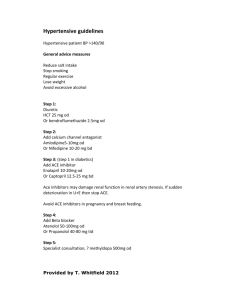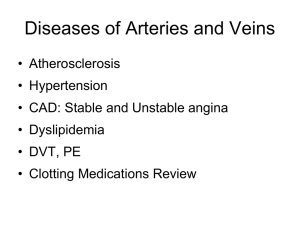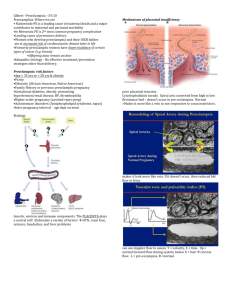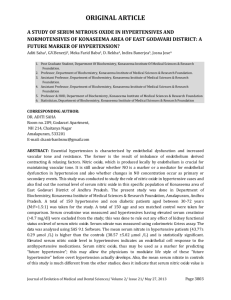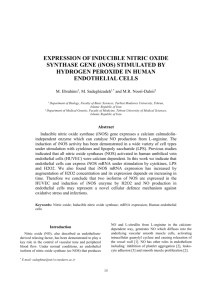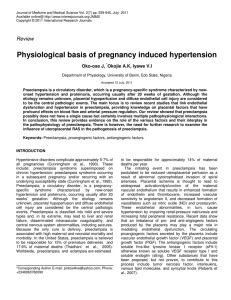Polymorphisms of endothelial nitric oxide synthase and
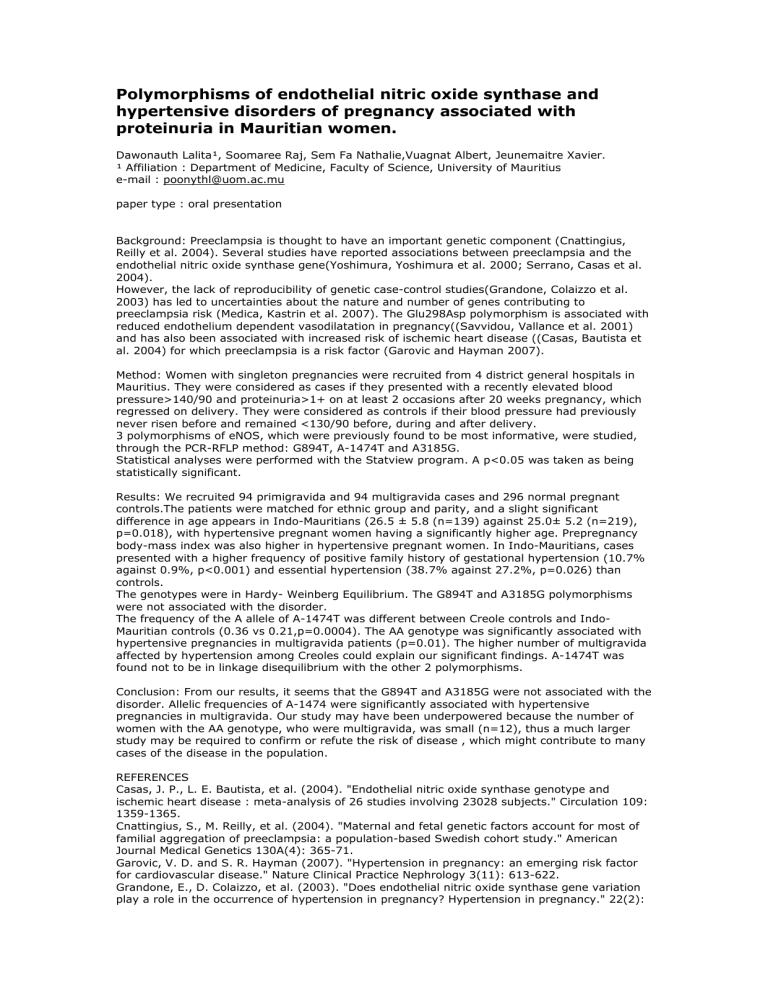
Polymorphisms of endothelial nitric oxide synthase and hypertensive disorders of pregnancy associated with proteinuria in Mauritian women.
Dawonauth Lalita¹, Soomaree Raj, Sem Fa Nathalie,Vuagnat Albert, Jeunemaitre Xavier.
¹ Affiliation : Department of Medicine, Faculty of Science, University of Mauritius e-mail : poonythl@uom.ac.mu paper type : oral presentation
Background: Preeclampsia is thought to have an important genetic component (Cnattingius,
Reilly et al. 2004). Several studies have reported associations between preeclampsia and the endothelial nitric oxide synthase gene(Yoshimura, Yoshimura et al. 2000; Serrano, Casas et al.
2004).
However, the lack of reproducibility of genetic case-control studies(Grandone, Colaizzo et al.
2003) has led to uncertainties about the nature and number of genes contributing to preeclampsia risk (Medica, Kastrin et al. 2007). The Glu298Asp polymorphism is associated with reduced endothelium dependent vasodilatation in pregnancy((Savvidou, Vallance et al. 2001) and has also been associated with increased risk of ischemic heart disease ((Casas, Bautista et al. 2004) for which preeclampsia is a risk factor (Garovic and Hayman 2007).
Method: Women with singleton pregnancies were recruited from 4 district general hospitals in
Mauritius. They were considered as cases if they presented with a recently elevated blood pressure>140/90 and proteinuria>1+ on at least 2 occasions after 20 weeks pregnancy, which regressed on delivery. They were considered as controls if their blood pressure had previously never risen before and remained <130/90 before, during and after delivery.
3 polymorphisms of eNOS, which were previously found to be most informative, were studied, through the PCR-RFLP method: G894T, A-1474T and A3185G.
Statistical analyses were performed with the Statview program. A p<0.05 was taken as being statistically significant.
Results: We recruited 94 primigravida and 94 multigravida cases and 296 normal pregnant controls.The patients were matched for ethnic group and parity, and a slight significant difference in age appears in Indo-Mauritians (26.5 ± 5.8 (n=139) against 25.0± 5.2 (n=219), p=0.018), with hypertensive pregnant women having a significantly higher age. Prepregnancy body-mass index was also higher in hypertensive pregnant women. In Indo-Mauritians, cases presented with a higher frequency of positive family history of gestational hypertension (10.7% against 0.9%, p<0.001) and essential hypertension (38.7% against 27.2%, p=0.026) than controls.
The genotypes were in Hardy- Weinberg Equilibrium. The G894T and A3185G polymorphisms were not associated with the disorder.
The frequency of the A allele of A-1474T was different between Creole controls and Indo-
Mauritian controls (0.36 vs 0.21,p=0.0004). The AA genotype was significantly associated with hypertensive pregnancies in multigravida patients (p=0.01). The higher number of multigravida affected by hypertension among Creoles could explain our significant findings. A-1474T was found not to be in linkage disequilibrium with the other 2 polymorphisms.
Conclusion: From our results, it seems that the G894T and A3185G were not associated with the disorder. Allelic frequencies of A-1474 were significantly associated with hypertensive pregnancies in multigravida. Our study may have been underpowered because the number of women with the AA genotype, who were multigravida, was small (n=12), thus a much larger study may be required to confirm or refute the risk of disease , which might contribute to many cases of the disease in the population.
REFERENCES
Casas, J. P., L. E. Bautista, et al. (2004). "Endothelial nitric oxide synthase genotype and ischemic heart disease : meta-analysis of 26 studies involving 23028 subjects." Circulation 109:
1359-1365.
Cnattingius, S., M. Reilly, et al. (2004). "Maternal and fetal genetic factors account for most of familial aggregation of preeclampsia: a population-based Swedish cohort study." American
Journal Medical Genetics 130A(4): 365-71.
Garovic, V. D. and S. R. Hayman (2007). "Hypertension in pregnancy: an emerging risk factor for cardiovascular disease." Nature Clinical Practice Nephrology 3(11): 613-622.
Grandone, E., D. Colaizzo, et al. (2003). "Does endothelial nitric oxide synthase gene variation play a role in the occurrence of hypertension in pregnancy? Hypertension in pregnancy." 22(2):
149-155.
Medica, I., A. Kastrin, et al. (2007). "Genetic polymorphisms in vasoactive genes and preeclampsia: A meta-analysis." European Journal of Obstetrics and Gynecology and
Reproductive biology 131: 115-26.
Savvidou, M. D., P. J. T. Vallance, et al. (2001). " Endothelial Nitric Oxide synthase gene polymorphism and maternal vascular adaptation to pregnancy. ." Hypertension 38: 1289-1293.
Serrano, N. C., J. P. Casas, et al. (2004). "Endothelial NO Synthase genotype and risk ofm preeclampsia- a multicenter case-control study." Hypertension 44: 702-707.
Yoshimura, T., M. Yoshimura, et al. (2000). "Association of the missense Glu298Asp variant of the endothelial nitric oxide synthase gene with severe preeclampsia. ." J Soc Gynecol Invest 7:
238-41
